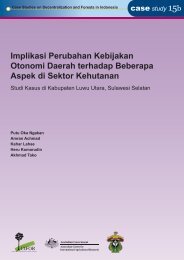Adaptive collaborative management of community forests in Asia ...
Adaptive collaborative management of community forests in Asia ...
Adaptive collaborative management of community forests in Asia ...
Create successful ePaper yourself
Turn your PDF publications into a flip-book with our unique Google optimized e-Paper software.
34 • Ravi Prabhu, Cynthia McDougall and Robert Fisher<br />
<strong>in</strong>creases <strong>in</strong> connectivity, result<strong>in</strong>g <strong>in</strong> the emergence <strong>of</strong> new ideas, forms <strong>of</strong><br />
organisation and actions.<br />
Social learn<strong>in</strong>g. The third and f<strong>in</strong>al process that we explore <strong>in</strong> phase 2 is<br />
social learn<strong>in</strong>g. In many ways, this process—or phenomenon—lies at the<br />
very heart <strong>of</strong> an adaptive <strong>collaborative</strong> <strong>management</strong> approach. It crosscuts<br />
and l<strong>in</strong>ks the <strong>collaborative</strong> and the adaptive aspects <strong>of</strong> the approach and,<br />
more importantly, enables <strong>in</strong>novation and cont<strong>in</strong>uous reconstruction <strong>of</strong><br />
forest plans, relationships, knowledge and worldviews. It embodies the<br />
reflexivity, or critical reflection, that social theorists such as Giddens (1984)<br />
and Archer (1996) highlight as essential to transform<strong>in</strong>g structure, agency<br />
and ultimately social systems. We draw on several sources (Maarleveld and<br />
Dangbegnon 1999; Mutimukuru et al. 2001; Buck et al. 2001) and our own<br />
research experience to def<strong>in</strong>e social learn<strong>in</strong>g as a multifaceted process <strong>in</strong><br />
which<br />
‘multiple stakeholders br<strong>in</strong>g together their different knowledge,<br />
experiences, perspectives, values and capacities<br />
for a process <strong>of</strong> communication and deliberation (or critical reflection/<br />
analysis)<br />
as a means <strong>of</strong> jo<strong>in</strong>tly understand<strong>in</strong>g and creat<strong>in</strong>g change/solutions<br />
regard<strong>in</strong>g shared issues/problems’ (McDougall et al. 2002: 28).<br />
Before we explore the theoretical foundations <strong>of</strong> social learn<strong>in</strong>g, we flag a<br />
few important dimensions suggested by this def<strong>in</strong>ition. First, the emphasis<br />
on social learn<strong>in</strong>g <strong>in</strong> an ACM approach po<strong>in</strong>ts to the significance <strong>of</strong> the<br />
learn<strong>in</strong>g that takes place not only by <strong>in</strong>dividuals but also by groups. Second,<br />
social learn<strong>in</strong>g <strong>of</strong>ten <strong>in</strong>volves political or power-related processes, <strong>in</strong>clud<strong>in</strong>g<br />
conflict <strong>management</strong>, with<strong>in</strong> the group (and possibly between the learn<strong>in</strong>g<br />
group and outside groups) because power relations and related struggles are<br />
a major aspect <strong>of</strong> natural resource <strong>management</strong> (McDougall et al. 2002).<br />
F<strong>in</strong>ally, we reiterate that social learn<strong>in</strong>g <strong>in</strong> an ACM approach <strong>in</strong>cludes both<br />
reflexive and anticipatory learn<strong>in</strong>g—<strong>in</strong> other words, learn<strong>in</strong>g from the past<br />
as well as consider<strong>in</strong>g future scenarios. As discussed earlier <strong>in</strong> this chapter,<br />
‘feedforward’ <strong>in</strong>cludes the critical process <strong>of</strong> envision<strong>in</strong>g an ideal, desired<br />
future, as well as anticipation <strong>of</strong> future challenges and uncerta<strong>in</strong>ties.<br />
Build<strong>in</strong>g on those po<strong>in</strong>ts, we now turn to the nature <strong>of</strong> learn<strong>in</strong>g <strong>in</strong> an ACM<br />
approach from a learn<strong>in</strong>g theory perspective. Draw<strong>in</strong>g from McDougall<br />
et al. (2002), we note that the concept <strong>of</strong> learn<strong>in</strong>g is usually associated<br />
with the accumulation <strong>of</strong> knowledge by an <strong>in</strong>dividual, as occurs <strong>in</strong> a<br />
tra<strong>in</strong><strong>in</strong>g or classroom context. In describ<strong>in</strong>g learn<strong>in</strong>g theory approaches
















